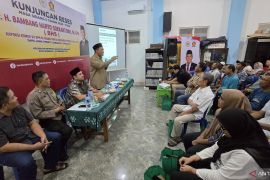Jakarta, (Antara) - A legislator has supported the idea to hold the trial of activist Salim Kancil's murder case at the district court of Lumajang District, East Java, to make it easier for the summoned witnesses.
The district court of Surabaya, East Java's provincial capital, is expected to hold the trial of Kancil's murder case soon after the Surabaya Prosecutor's office transfers the dossiers of 36 suspects.
However, legislator Masinton Pasaribu, a member of Commission III on legal affairs of the House of Representatives (DPR), supported the request of the victim's lawyer for the trial to be held in Lumajang.
"The request of Kancil and Tosan's lawyer that the trial of the case of the two environmental activists should be held in Lumajang is logical and deserves to be considered," Masinton stated here on Friday.
The reason is that Surabaya is very far from Lumajang. It will be highly burdensome for the witnesses who are mostly farmers to travel the long distance to Surabaya. As there are several investigation reports or dossiers in Kancil's case, thus due to the distant location, it might only be possible for one witness to be present during the court's proceedings.
This case needs high concentration (many witnesses), Masinton remarked.
In addition, if the trial is held in Lumajang, it will provide moral support to the victims' families and the witnesses, and hence, the verdict to be taken on the case would be as fair as possible.
"We hope this trial would become the focus of our attention, so that it will bring justice to humanity and to the families of the victims, in particular," the legislator affirmed.
In September 2015, Kancil, a 52-year-old villager, was allegedly beaten to death by a group of people in the Selok Awar-Awar sub-district, Pasirian district. The same group also allegedly assaulted 51-year-old Tosan, another villager, leaving him in a critical condition.
Three days before the incident, the two victims, along with dozens of fellow villagers, staged a rally to protest against sand-quarrying activities on Watu Pecak Beach, also in Selok Awar-Awar sub-district.
The protesters claimed that the mining activities harmed the environment, leaving holes five meters in diameter and a meter deep on the beach.(*)









